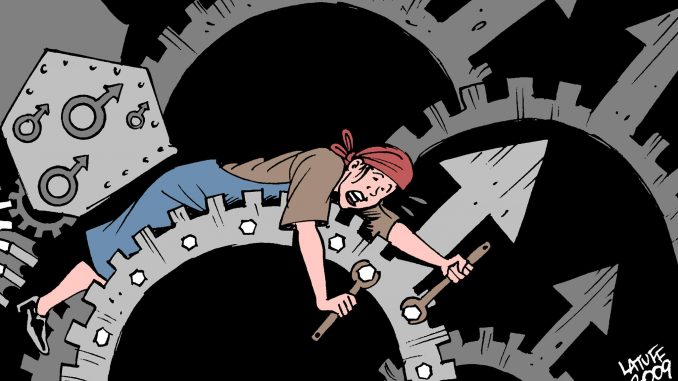
When I first met Feminism and I started getting involved, there was a stereotype that drew my attention. The USSR (the Union of Soviet Socialist Republics) experience was degraded to motherhood medal, socialism was degraded to USSR experience, and the emancipation of women was said to come to nothing with socialism. Most of the feminist women that I have spoken, have read or who have shared their experiences used to say that the socialist men they were surrounded with were machos, and were complaining that the women rights were deferred to “after revolution”.
The stereotype I described above is not totally untrue. However, within time I have realised that this stereotype was a kind of discourse where the individual stops questioning due to over repetition and accepts it as the truth. And there is no doubt that there is not only one type of feminism, rather the feminists have different ways of interpreting the past as well as varied political approaches.
Bolshevik Revolution (October Revolution) and the Women
The distribution of the motherhood medal during the period of Stalin was a fact and this was not something to be defended. However, during this period the progressions derived from the revolution were regressing and it was a fact that this could not be accepted as identical to the USSR experience. This is because the Bolshevik Revolution was presenting us the experience of the policies put into practice so that the women would be involved in social life by getting rid of their imprisonment to their private space, laws promoting civilised rights and easing the divorce as well as the presence of the women and the LGBT ministers.
The Macho ‘Socialists’ and Clara Zetkin
Similar to what generally happened in politics, in history, men at the socialist parties said that ‘the time has not come yet’ for women to use their right to vote, their right to stand for election, and to be actively involved in politics today. While some feminists were interpreting this as ‘socialist men are machos’, Clara Zetkin – a woman who has an important place within the socialist movement – said that men who make mention of this idea have betrayed socialism. And Engels in propria persona supported her in her fight within the party.
Women in Cuba
When we look at the Cuba, before the revolution working women used to work extensively as servants and sex workers, whereas after the revolution women urgently became literate, trainings were provided nationally so that they could acquire a profession and women graduating from the higher education as doctors and engineers. Public day care centres and laundries are also continuing to be an obstacle for women to be confined in the house.
Venezuela Experience
If we look at the recent past, we see that Chavez used to provide social security for the household labour by constitution as well as gender equality. As a response to the prevalent problem of the women being sacked during their pregnancy – which is also very common in our country – on top of the work security, the employer had the obligation to provide child care support under the Labour Act.
Does a system relying on the exploitation of woman labour provide emancipation for women?
To sum up, there are plenty of conventional leftists who describe themselves as socialists then evaluate the emancipation of women as a subordinate matter. However, this situation should not be seen as women will not be liberalised with socialism, rather should be interpreted as moving away from the socialist ideology.
By hiding behind such statement that “socialist men are machos” in patriarchal capitalism which relies on discrimination and exploitation, seeing capitalist centrals’ (such as UN and EU) international contracts as providing the liberalisation of women, as bringing peace or as magical formula that will protect the labourers right; with my courtesy, is naivete. The emancipation of the labour and the women is a socialist goal. Because, as Chavez said “Socialists should also be feminists, otherwise their humanity will be incomplete”.
Writer: Cansu N. Nazli
Translated by: G. I.
Article first published on: 16/03/2017
Original article in Turkish: http://www.ankaradegillefkosa.org/bazi-feminist-ezberler-ve-sosyalist-deneyimler-cansu-n-nazli/


